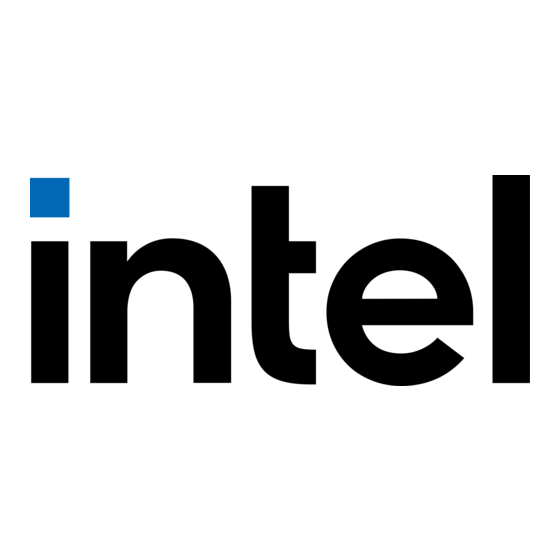
Advertisement
Quick Links
Product Brief
Intel® IP Network Server NSW1U
Telecom and Compute Products
Intel
IP Network Server NSW1U
®
Now supporting the Quad-Core Intel® Xeon® processor 5400 Series
The Intel® IP Network Server NSW1U provides an unmatched
combination of network port density and CPU performance
in a compact package that is ideal for Services over IP (SoIP).
The NSW1U uses Intel's most advanced 64-bit quad-core
processor, offering high performance coupled with power
efficiency, to provide improved performance per watt over
previous-generation rack-mount servers.
As an alternative to custom chassis for network security
applications, the NSW1U is uniquely suited for network data
applications with high I/O requirements. With a longer life than
enterprise servers and with many of the features found on
carrier-grade servers, the NSW1U raises the performance bar
for IP network security products by supporting Intel® I/O
Acceleration Technology
(Intel® I/OAT), Intel® 64 architecture
1
and Fully Buffered DIMM technology at 533 MHz and 667 MHz.
Quad-Core Intel® Xeon® Processor 5400 Series
Intel's newest and most advanced 64-bit quad-core processors —
the Quad-Core Intel® Xeon® processor 5400 series on 45nm tech-
nology — enable higher levels of performance, power efficiency,
and reliability. These processors incorporate Intel® Core™ micro-
architecture for energy-efficient performance and improved
server density, enabling the NSW1U to optimally balance
processing capabilities within power and space constraints,
and provide operational cost savings. The larger 12 MB L2 cache,
shared by all cores, provides dynamic allocation between the
cores based on application load. This significantly reduces actual
latency when accessing the most commonly used data.
Intel® Virtualization Technology
run multiple operating systems and applications in independent
partitions and facilitates remotely upgradeable applications and
operating systems, reducing total cost of ownership.
(Intel® VT) allows a platform to
3
2
Intel I/OAT moves data more efficiently through Intel Xeon
processor-based servers for fast, scalable, and reliable network
performance. It significantly reduces CPU overhead to free
resources for more critical tasks, and provides network
acceleration that scales seamlessly across multiple Gigabit
Ethernet (GbE) ports, providing a safe and flexible choice
that is tightly integrated into popular operating systems.
Applications
The NSW1U is suited for a variety of network security
applications such as intrusion detection/intrusion prevention,
firewall, and virus protection. Up to eight Ethernet ports provide
high throughput for applications such as video processing and
IPTV. In addition, data center applications such as VoD, online
gaming, SoIP, and billing may be supported. The NSW1U also
supports manufacturing, industrial, utility, and even military
applications where a rugged, highly reliable server is required.
Advertisement

Summary of Contents for Intel NSW1U - IP Network Server
- Page 1 Intel’s newest and most advanced 64-bit quad-core processors — Ethernet (GbE) ports, providing a safe and flexible choice the Quad-Core Intel® Xeon® processor 5400 series on 45nm tech- that is tightly integrated into popular operating systems. nology — enable higher levels of performance, power efficiency, and reliability.
- Page 2 Management Module Dual GbE (Front) PATA Gbit LAN Optical Intel Remote Intel® PCIe x4 Drive Management NIC 82571EB Gbit LAN Dual GbE PHY Dual GbE (Front) NSRA0401W only Figure 1. Intel® IP Network Server NSW1U Block Diagram (fully configured system)
-
Page 3: Specifications
Type Single 64-bit Quad-Core Intel® Xeon® processor Cache Memory 12 MB or 4 MB shared L2 cache 5400 series or single 64-bit Dual-Core Intel® Maximum Memory Capacity 24 GB with 4 GB memory per DIMM Xeon® processor 5100 series Registered ECC SDRAM DIMMs Chipset Intel®... -
Page 4: Regulatory Compliance
Intel® I/O Acceleration Technology (Intel® I/OAT) requires an operating system that supports Intel I/OAT. 64-bit computing on Intel architecture requires a computer system with a processor, chipset, BIOS, operating system, device drivers and applications enabled for Intel® 64 architecture. Processors will not operate (including 32-bit operation) without an Intel®...









